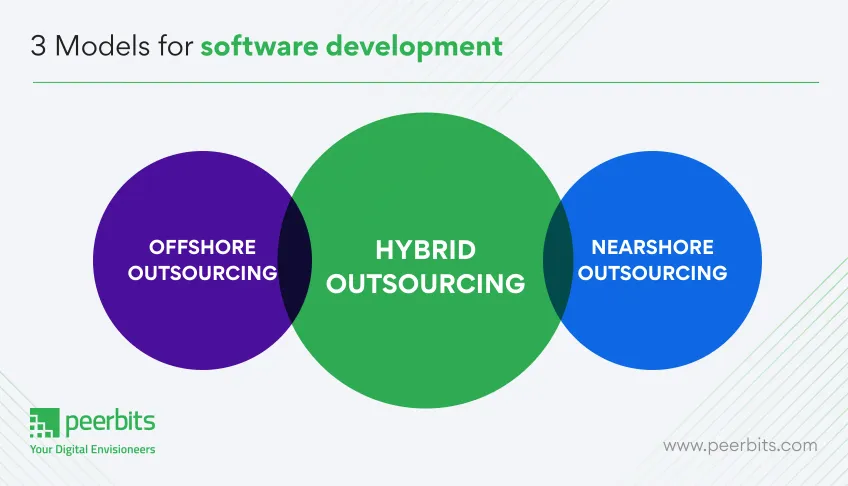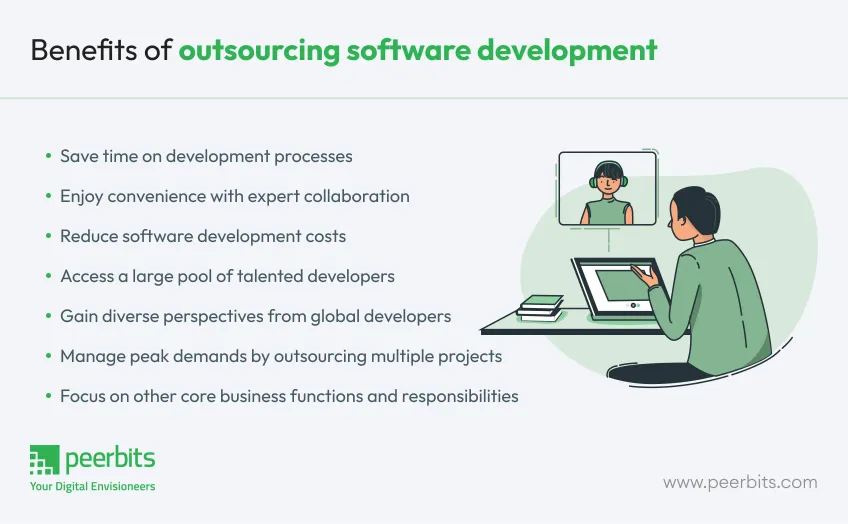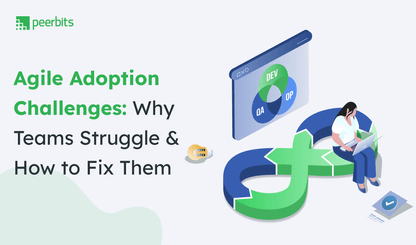Outsourcing software development to a remote or hire offshore development team can be rewarding and reduce business costs. However, if you’re someone who is exploring IT outsourcing services to support their business, it's quite natural to have some fears and doubts about the risks involved and be prepared in advance.
While these risks can’t be avoided entirely, taking the right steps can also minimize their impact and help ensure a smooth development process.
In this blog, we’ll explore how to manage 9 biggest outsourcing risks effectively. From understanding the key challenges to practical solutions and reasons why outsourcing might still be the best choice.
First, let’s get a clear picture of software development outsourcing.
What is software development outsourcing?
Outsourcing development to an external company means hiring a skilled team to manage various stages of the software development process, such as design, development, testing, and maintenance.
Utilizing software development outsourcing services helps businesses reduce costs, tap into specialized expertise, and speed up time-to-market by taking advantage of seasoned professionals and offshore resources.
Outsourcing also aids companies in focusing on their core business while the external team’s technical skills and knowledge work dedicatedly to develop their custom software solutions.
Whether it’s a short-term project or long-term collaboration, outsourcing can be a strategic move for businesses looking to stay competitive in a rapidly evolving era.
According to Statista, the IT outsourcing market is anticipated to reach $541.1 billion in revenue by 2024. This market is expected to grow at an annual rate of 8.48% from 2024 to 2029, potentially reaching $812.7 billion by 2029.
Outsourcing software development services can be quite beneficial to your business as it:
- Give you access to a larger talent pool
- Increases productivity
- Improves delivery time
- Saves time
- Reduces cost
Outsourcing models: offshore, hybrid, and nearshore for software development
In outsourcing software development, you allocate and delegate parts or all of your software development functions to a remote or offshore team. There are different types of outsourcing development models for software development as follows:

| Outsourcing Model | Description | Benefits |
|---|---|---|
| Offshore outsourcing | Hiring an outsourcing team or individual from a different country or city with lower labor costs and skilled expertise. It helps businesses reduce costs while obtaining quality work. |
|
| Nearshore outsourcing | Outsourcing software development to a nearby or adjacent location. This model offers cultural proximity and convenience. |
|
| Hybrid outsourcing | A blended way involving both on-site and offshore developers, providing flexibility and control over business operations. |
|
Choosing the right outsourcing model is important for your business, and understanding the different options can help you make an informed decision maker. Now that we've explored the outsourcing models, let's get into the risks of outsourcing software development and strategies to avoid them.
Top 9 risks of outsourcing software development & how to overcome them
When you decide to outsource software development, certain major risks can come into play. Here’s what to watch for and how to navigate outsourced software development risks effectively:

1. Reliability, uncertainty, and trust
Most of the companies talk about their vast experience and come with promises of perfect project deliverables. Everyone does well in their pitch but what you need is credibility.
Are they as good as they say at their work? Are they reliable to work with? Building trust is always important.
Your entire business depends on it and you cannot outsource your project to just anyone. Here is how you can overcome this:
- Company website: Check the company's history, offerings, and services.
- Social media: Observe their online presence and reputation across platforms.
- Projects & case studies: Review their past projects and client success stories and case studies.
- Third-party reviews: Read reviews on platforms like Clutch and GoodFirms.
- Client testimonials: Watch or read client testimonials and speak with previous clients for feedback.
2. Domain expertise
Software development varies from project to project. There are different requirements for developers who excel in different languages, frameworks, and technologies.
Before outsourcing your software development requirements to a third-party firm, you must check the portfolio of projects they have done.
- Assess company offerings: Read all the company offerings and services on the company website.
- Check case studies: Read all case studies of the projects they have completed and successfully delivered.
3. Knowledge, tools and proficiency
Outsourcing firms will pitch you that they are proficient in the latest technologies with highly skilled developers. How can you be sure that the vendor company’s developers are as skilled and proficient as much as they are saying?
In the name of cost reduction, you do not want a company that cannot fulfill your basic requirements. You need experts and skilled professionals for all your project requirements. Here is how you can tackle this:
- Technology skills: Verify the developers' skills and proficiency in the latest technologies.
- Software & tools: Check the tools and software they use for development.
- Team planning & learning: Understand their project management and strategy, and observe how they stay updated on new technologies.
4. Time-zone adjustment
Outsourcing IT services to a nearby location or a different country means dealing with concerns regarding time zones. Sometimes, the outsourcing companies may be in an opposite time zone, either ahead or behind your business's existing location.
In such cases, risks involve uncertainty about whether the project will be delivered within the stipulated time or not.
There will also be concerns regarding the availability of tech support at odd times due to both parties being in different time zones. Here is how you can overcome this:
- Find companies providing 24×7 tech support.
- Select the companies with the best client reviews when it comes to the time factor.
- Go for the company that has excellent and quick deliverables of its projects.
5. Loss of control over the project
IT outsourcing risks and challenges include the loss of control over your project. Your project requires creative direction, and your requirements need to be fulfilled according to your expectations, using the tools and technologies preferred by your firm.
Many outsourcing companies promise to assign highly skilled and experienced developers to your project, but once it's underway, less experienced developers may be assigned instead. You might also find that you're not allowed direct contact with the developers.
This loss of control can negatively impact the quality and outcome of your project. Mismanagement by the outsourcing company can lead to a loss of time, money, and effort. Here's how you can mitigate these risks:
- Plan, strategize & implement: Create a detailed management plan with clear responsibilities and project requirements, including preferred technologies, tools, and frameworks.
- Communication channels: Establish direct communication with the outsourcing team, ensuring regular updates and assigning a primary point of contact.
- Track KPIs: Set milestones and deadlines throughout the project and monitor key performance indicators at various stages to ensure progress.
6. Privacy, security, and confidentiality
Outsourcing software development to a third-party organization in a different country means giving your business access to an outsider. It is natural that there will be uneasiness in exchanging sensitive information and data outside of your organization.
Hiring a reputed company reduces the chances of privacy, security, and confidentiality issues, but outsourcing risks still exist, including the possibility of information leakage.
You can't always be certain that an organization from another country will follow the laws of your own. Here’s how you can protect your project:
- Signing NDA: Review the company’s data protection policies and ensure they sign a Non-disclosure Agreement (NDA).
- Code ownership: Secure a clear contract specifying ownership of the source code and agree on who can make changes to the design and code.
7. Hidden and uncertain costs
When outsourcing software development, there’s a risk that the company may charge additional fees at the end for changes or last-minute modifications. The main goal of outsourcing is to save costs, not to incur more.
The outsourcing vendor might introduce unforeseen, hidden costs, such as upgrades, relocation, redeployment, after-hour services, troubleshooting, and more.
These unexpected expenses can quickly add up, pushing the overall project cost beyond the budget. Here’s how you can avoid these software development outsourcing risks:
- Define requirements: Clearly communicate your needs and expectations with the outsourcing company. Request a detailed, itemized list of all project expenses from start to finish.
- Engage with a law firm: Involve a third-party law firm to review the outsourcing agreement and ensure all additional costs are clearly outlined in a legally binding contract.
8. Service quality and performance
All businesses aim to deliver excellent results. When an outsourcing company pitches its services, it often promises high-quality software deliverables.
However, it is not guaranteed that a new third-party service provider you have never worked with, will deliver quality results according to your expectations.
Therefore, ensure they have a strong quality assurance process in place to maintain standards and meet your expectations.
If the service quality is not there, there will be losses of both time and money for your business when you are only looking for a quick, cost-effective solution. Here is how you can evaluate the quality of work of any service provider:
- Talk with past clients: Reach out to previous clients to discuss their experience, deliverables, work process, and the outsourcing company's work ethics.
- Methodology of project: Request a detailed project plan, including the steps, tools, techniques, and technologies that will be used from start to finish.
- Quality testing: Understand the quality assurance process, the stages of testing, and how bugs are tracked and resolved during the project.
9. Barriers in communication
Miscommunication is among the biggest risks faced when outsourcing a software development project to another company. Regardless of the tools you use, without a well-defined communication channel and flow, mishaps are inevitable.
For instance, if you are hiring a team from a country with the opposite time zone, one of you will have to clock in at night and get into detailed discussions and explain the changes or ideas on behalf of your entire team to their team.
For instance, if you are hiring a team from a country with the opposite time zone, one of you will have to clock in at night and get into detailed discussions and explain the changes or ideas on behalf of your entire team to their team.
- Allocate a SPOC: Designate a skilled person to manage communication and resolve conflicts between teams.
- Set up regular communication: Include regular meetings in the agreement to ensure consistent updates and alignment on project progress.
Why should you outsource your software development?

Outsourcing comes with its risks and returns. On one side there are tremendous risks but on the other side, it comes with so many valuable advantages that it overcomes the risks and obstacles.
Best practices for signing outsourcing agreements
Surely, the benefits of outsourcing software development justify its immense effectiveness. Still, there are some key practices that you shouldn’t avoid while signing your final outsourcing software development agreements. Make sure to:
- Detail project requirements, timelines, and deliverables to align expectations and keep the project on track.
- Define roles, responsibilities, and quality standards to reduce confusion and help manage performance.
- Include clauses for intellectual property and data privacy to protect your business.
- Add terms for scope changes, performance benchmarks, and penalties for missed deadlines to maintain accountability.
- Secure your interests by ensuring clear contract terms for project modifications and expectations.
Real-world examples of software outsourcing development success
A global aviation solutions provider from Lisbon faced challenges with multiple databases and system lags, affecting their ability to provide a seamless experience during airline disruptions.
Seeking to streamline their flight operations and inventory management, they partnered with Peerbits for outsourcing IT services and solutions.
Utilizing our expertise in custom development, they improved operational efficiency and enhanced passenger offerings, meeting critical needs without an in-house team expansion.
Conclusion
Outsourcing software development presents both valuable opportunities and potential risks. While risks are part of the equation, the benefits often far outweigh them, especially when the right partner is chosen. Outsourcing offers significant cost savings, access to a larger talent pool, and the ability to scale resources as needed.
At Peerbits, we specialize in helping businesses maximize the advantages of outsourcing while effectively managing the associated risks. With our experience, we can navigate the complexities of outsourcing software development, ensuring high-quality deliverables and a smooth process.
Take advantage of outsourcing your software development with Peerbits. Schedule a call with our experts right away, minimizing risks and maximizing the benefits of your software development.

FAQ's
Clearly define project goals, establish milestones, and maintain regular communication with the vendor to stay on top of progress.
Make sure the vendor follows strict security protocols, signs non-disclosure agreements (NDAs), and confirms they comply with relevant laws and regulations.
Request detailed, transparent pricing upfront, and ensure the contract includes provisions for handling additional costs or changes.
Set clear expectations for communication, choose a vendor in a compatible time zone, and use tools like video conferencing and project management software.
Establish clear deadlines, and ask for daily or weekly reports of the hired talent, use a project management tool to track their progress, and have a contingency plan in place.








